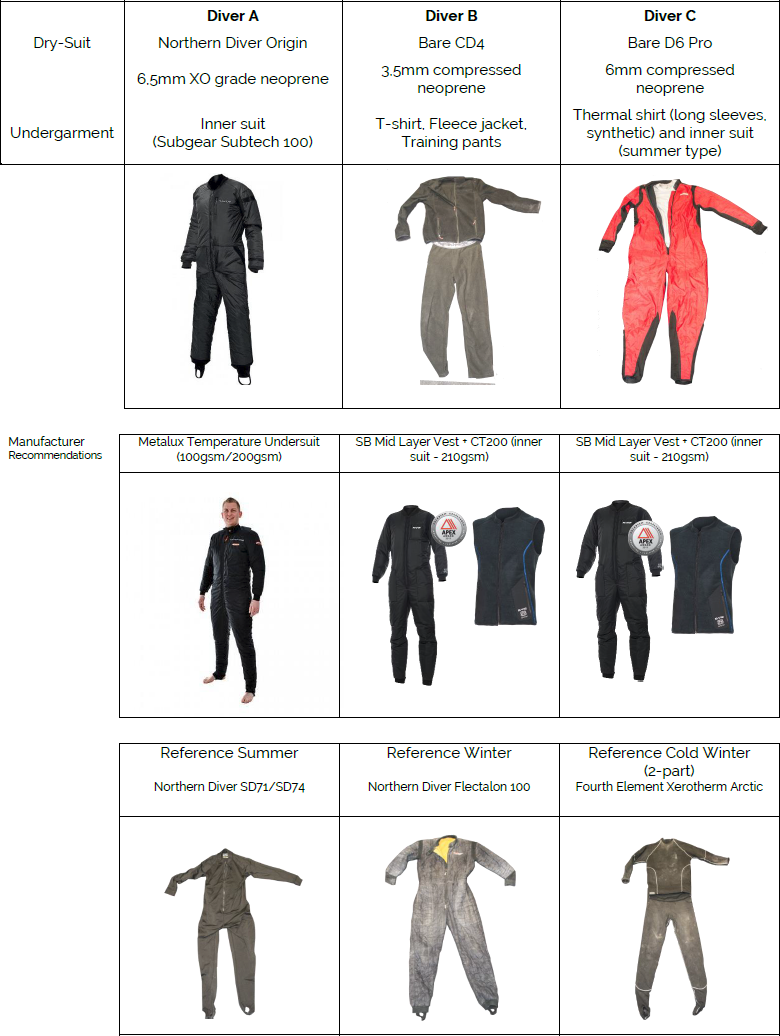Three incidents of decompression illness (DCI)
A member has reported three instances of decompression illness on the same diving project. The dives were to a depth of
40m in June in temperate waters. Water temperature at the seabed was 5°C and 9°C at the surface:
- Diver A experienced a DCI in his left lower arm (muscle);
- Diver B experienced a DCI in his left knee and right shoulder (joints);
- Diver C experienced a DCI on his right shoulder/ upper arm (skin).
Our member’s investigation noted the following:
- Initial checks of the DCI cases didn’t reveal any signs of procedural or material failures;
- The three divers underwent additional examinations by the diving doctor with the focus on:
- Personal build of the individuals including measurements (length, width, circumference and weight);
- Fat percentages;
- Use of dietary supplements.
- These examinations showed that these divers had quite normal fat percentages (13-25%) and that they were quite fit. Additional examinations did not reveal any indicators that could predict a higher risk to DCIs. . There were no notable findings with regard to sleeping, eating (including use of supplements), drinking and sporting habits; . No abnormalities during the deck decompression were noted.
What came to light was the relationship between the water temperature and in-water decompression and clothing:
- In all the three incidents the divers noted the water temperature was low;
- One diver explained the temperature was much lower than experienced last year in the same location around the same time of the year;
- Whereas last year the divers were able to work with normal gloves, this year they used the thicker versions to reduce the cooling down of the hands.
Diver A reported that he used normal gloves in his first dive. As his hands got cold he decided to use his own ‘long-sleeve’ gloves. He used the same gloves on the previous project, where he already suffered from ‘sour’ underarms as these gloves were quite tight (as they were older).
Diver B reported that he was working quite hard to handle a tirfor tackle. He explained that he was sweating quite a lot, part of the time he was working on his knee, and he felt really cold during the in-water stops. When asked what kind of undergarment he was wearing, he explained a t-shirt, thin fleece jacket and sports trousers (track suit).
Diver C reported that he was working quite hard to move gravel bags around. He explained he was sweating quite a lot, but didn’t feel cold. He further explained that for him it was quite normal to still feel comfortable, even though his skin had become cold. When asking what kind of undergarment he was wearing, he explained a long-sleeve thermal shirt (normal synthetic type) and a summer-type under-suit.
After comparison of the combination of dry-suit undergarments divers B and C were wearing, including consulting manufacturer’s recommendations, it was concluded that they were insufficiently dressed for the temperature conditions.
The lessons learnt:
- Diver A’s long sleeved gloves were too tight;
- Divers B and C were using undergarments insufficient for the conditions of the dive.
The following actions were recommended:
- Divers should wear correct and sufficient clothing for the dives they are going to make – in terms of duration, type of work, and sea water temperature. This should include sizing (garments should be properly fitted) and insulation properties (under-suits that are made of suitable materials in view of compression, moisture absorption and thermal properties):
- Supervisors should consider restriction or adjustment of the dive profile (e.g. reduce bottom time and/or tasks) if a diver does not have the possibility to wear the appropriate clothing, so that increased risk of DCI is avoided.
For reference, here is a table outlining the divers clothing on this dive:

Members may wish to refer to the following incidents (search words: DCI, diver):
Safety Event
Published: 19 November 2015
Download: IMCA SF 18/15
IMCA Safety Flashes
Submit a Report
IMCA Safety Flashes summarise key safety matters and incidents, allowing lessons to be more easily learnt for the benefit of all. The effectiveness of the IMCA Safety Flash system depends on Members sharing information and so avoiding repeat incidents. Please consider adding safetyreports@imca-int.com to your internal distribution list for safety alerts or manually submitting information on incidents you consider may be relevant. All information is anonymised or sanitised, as appropriate.
IMCA’s store terms and conditions (https://www.imca-int.com/legal-notices/terms/) apply to all downloads from IMCA’s website, including this document.
IMCA makes every effort to ensure the accuracy and reliability of the data contained in the documents it publishes, but IMCA shall not be liable for any guidance and/or recommendation and/or statement herein contained. The information contained in this document does not fulfil or replace any individual’s or Member's legal, regulatory or other duties or obligations in respect of their operations. Individuals and Members remain solely responsible for the safe, lawful and proper conduct of their operations.
